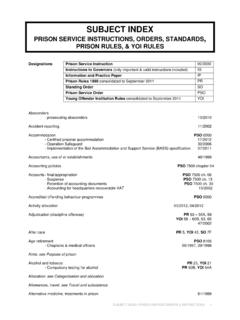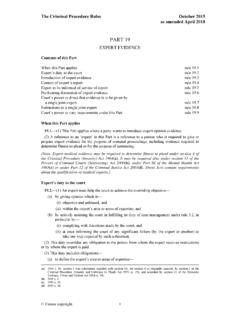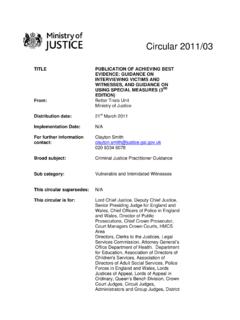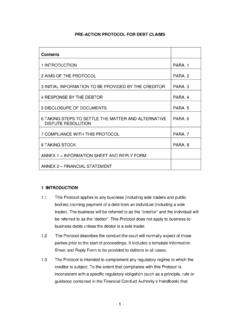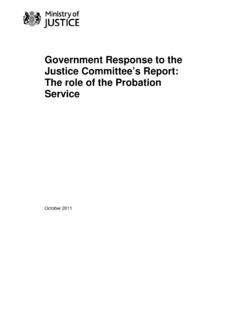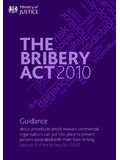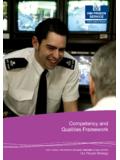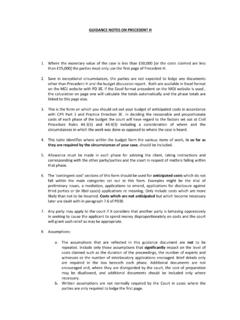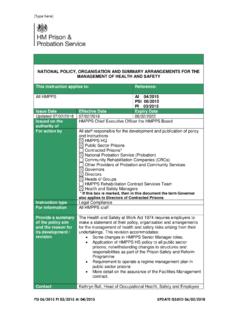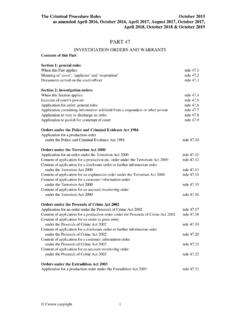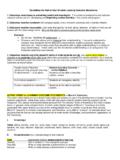Transcription of CRIMINAL PRACTICE DIRECTIONS - Justice.gov.uk
1 CRIMINAL PRACTICE DIRECTIONS Table of Content 1 CPD Division CPD ref Title of CPD, if applicable CPD I General matters A CPD I General matters 1A CPD I General matters 3A Case management CPD I General matters 3B Pagination and indexing of served evid ence CPD I General matters 3C Abuse of process stay applications CPD I General matters 3D Vulnerable people in the Courts CPD I General matters 3E Ground rules hearings to plan the questioning of a efendant vulnerable witness or dCPD I General matters 3F Intermediaries CPD I General matters 3G Vulnerable defendants CPD I General matters 3H Wales and the Welsh Language.
2 Devolution issues CPD I General matters 3J Wales and the Welsh Language: Applications for evidence to be given in Welsh CPD I General matters 3K Wales and the Welsh Language: Use of the Welsh Language in Courts in Wales CPD I General matters 5A Forms CPD I General matters 5B Access to information held by the Court CPD II Preliminary proceedings 6A Investigation orders and warrants CPD II Preliminary proceedings 9A Allocation (mode of trial) CPD II Preliminary proceedings 10A Defendant s record CPD II Preliminary proceedings 14A Settling the indictment CPD II Preliminary proceedings 14B Voluntary bills of indictment CPD II Preliminary proceedings 16A Unofficial sound recording of proceedings CPD II Preliminary proceedings 16B Restrictions on reporting proceedings CPS III Custody and bail 19A Bail before sending for trial CPD III Custody and bail 19B Bail.
3 Failure to surrender and trials in absence CPD III Custody and bail 19C Penalties for failure to surrender CPD III Custody and bail 19D Relationship between the Bail Act offence and further remands on bail or in custody CPD III Custody and bail 19E Trials in absence CPD III Custody and bail 19F Forfeiture of monies lodged as security or pledged by a surety/estreatment of recognizances CPD III Custody and bail 19G Bail during trial CPD III Custody and bail 19H Crown Court judge s certification of fitness to appeal and applications to the Crown Court for 2bail pending appeal CPD IV Disclosure 22A Disclosure of unused material CPD V Evidence 27A Evidenc e by written statement CPD V Evidence 27B Video recorded evidence in chief CPD V Evidence 27C Evidence of audio and video recorded interveiws CPD V Evidence 28A Wards of Court and children subject to current Family proceedings CPD V Evidence 29A Measures to assist a witness or defendant to give evidence CPD V Evidence 29B Witnesses giving evidence by live link CPD V Evidence 29C Visually recorded interviews.
4 Memory refreshing time from the jury and watching at a different CPD V Evidence 29D Witness anonymity orders CPD V Evidence 35A Spent convictions CPD VI Trial 37A Role of the justices clerk/legal adviser CPD VI Trial 39A Juries: introduction CPD VI Trial 39B Juries: preliminary matters arising before jury service commences CPD VI Trial 39C Juries: eligibility CPD VI Trial 39D Juries: precautionary measures before swearing CPD VI Trial 39E Juries: swearing in jurors CPD VI Trial 39F Juries: ensuring an effective jury panel CPD VI Trial 39G Juries: preliminary instructions to jurors CPD VI Trial 39H Juries: discharge of a juror for personal reasons CPD VI Trial 39J Juries: views CPD VI Trial 39K Juries: DIRECTIONS to jury before retirement CPD VI Trial 39L Juries: jury access to exhibits and evidence in retirement CPD VI Trial 39M Jury Irregularities CPD VI Trial 39N Open justice CPD VI Trial 39P Defendant s right to give or not to give evidence CPD VI Trial 39Q Majority verdicts CPD VII Sentencing A Pleas of guilty in the Crown Court CPD VII Sentencing B Determining the factual basis of sentence CPD VII Sentencing C Indications of sentence.
5 R v Goodyear CPD VII Sentencing D Facts to be stated on pleas of guilty CPD VII Sentencing E Concurrent and consecutive sentences CPD VII Sentencing F Victim Personal Statements CPD VII Sentencing G Families bereaved by homicide onduct and other CRIMINAL cCPD VII Sentencing H Community Impact Statements CPD VII Sentencing I CPD VII Sentencing J Binding over orders and conditional discharges CPD VII Sentencing K Committal for sentence CPD VII Sentencing L Imposition of life sentences CPD VII Sentencing M Mandatory life sentences CPD VII Sentencing N Transitional arrangements for sentences where the offence was committed before 18 December 2003 CPD VII Sentencing P Procedure for announcing the minimum term in open court CPD IX Con court tempt of 62A Con tempt in the face of the magistrates court CPD X Appeal 63A Appeals to the Crown Court CPD X Appeal 68A Appeals against conviction and sentence the provision of notice to the prosecution CPD X Appeal 68B Listing of appeals against conviction and sent CRIMINAL Division (CACence D)
6 In the Court of AppealCPD X Appeal 68C Appeal notices containing grounds of appeal CPD X Appeal 68D Respondents notices CPD X Appeal 68E Loss of time CPD X Appeal 68F Skeleton arguments CPD X Appeal 68G CRIMINAL Appeal Office summaries CPD X Appeal 75A References to the European Court of Justice CPD XI Costs CPD XII General application A Court dress CPD XII General application B Modes of address and titles of judges and magistrates CPD XII General application C Availability of judgments given in the Court of Appeal and the High Court CPD XII General application D Citation of authority and provision of copiejudgments to the Court s of CPD XII General application E Preparation of judgments: neutral citation CPD XII General application F Citation of Hansard I General matters CPD I G ra ene l matters A The Lord Chief Justice has power, including power under section 74 of the Courts Act 2003 and Part 1 of Schedule 2 of the Constitutional Reform Act 2005, o make DIRECTIONS as to the PRACTICE and procedure of the CRIMINAL courts.
7 The tfollowing DIRECTIONS are made accordingly. These PRACTICE DIRECTIONS replace the Consolidated CRIMINAL PRACTICE Direction of 8 July 2002 ([2002] 1 2870; [2002] 2 Cr. App. R. 35), as amended, which is hereby revoked, with the exception of sections , , , , and The PRACTICE DIRECTIONS , PRACTICE Notes and PRACTICE Statements listed in Annex A and Annex B of the 2002 consolidation, with the exception of PRACTICE Direction: (Supreme Court) (Devolution Issues) [1999] 1 LR 1592; [1999] 3 All ER 466; [1999] 2 Cr App R 486, are also revoked. W 3 Annexes D, E and F remain in force. These PRACTICE DIRECTIONS , which shall be known as the CRIMINAL PRACTICE DIRECTIONS , take effect from the 7th October 2013.
8 They apply to all cases in all the CRIMINAL courts of England and Wales from that date. Part 1 The overriding objective CPD I G a ener l matters 1A The presumption of innocence and an adversarial process are essential features of English and Welsh legal tradition and of the defendant s right to a fair trial. But it is no part of a fair trial that questions of guilt and innocence should be determined by procedural manoeuvres. On the contrary, fairness is best served when the issues between the parties are identified as early and as clearly as possible. As Lord Justice Auld noted, a CRIMINAL trial is not a game under which a guilty defendant should be provided with a sporting chance.
9 It is a search for truth in accordance with the twin principles that the prosecution must prove its case and that a defendant is not obliged to inculpate himself, the object being to convict the guilty and acquit the innocent. Further, it is not just for a party to obstruct or delay the preparation of a case for trial in order to secure some perceived procedural advantage, or to take unfair advantage of a mistake by someone else. If courts allow that to happen it damages public confidence in CRIMINAL justice. The Rules and the PRACTICE Direction, taken together, make it clear that courts must not allow it to happen. Part 2 Understanding and applying the Rules P art 3 Case management CPD I G a ener l matters 3A: CASE MANAGEMENT To avoid unnecessary and wasted hearings, the parties should be allowed adequate time to prepare, having regard to the time limits for applications and notices set by the CRIMINAL Procedure Rules and by other legislation.
10 When d. those time limits have expired, the parties will be expected to be fully The required forms and guidance notes can all be found in Annex D. PDF and Word versions are available on the CRIMINAL Procedure Rules pages of the Ministry of Justice website. The forms to be used in magistrates courts contain DIRECTIONS some of which are determined by CRIMINAL Procedure Rules or other legislation and some of which are discretionary, as explained in the guidance notes. All those DIRECTIONS apply in every case unless the court otherwise orders. Cases be tried in a magistrates court or a youth court The trial preparation form authorised for use must be used.
